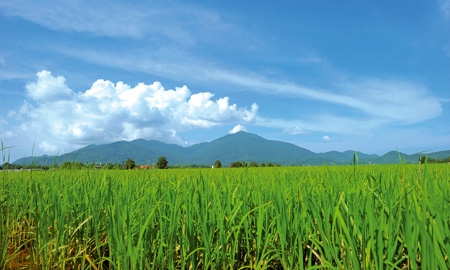
Some of the main exports of Malaysia, especially to China, are electronic and electrical devices manufactured in Kedah. Chief Minister of the State of Kedah, Dato’ Seri Mukhriz bin Tun Dr Mahathir, would like to see the state move away from agriculture, and begin focusing on less labour-intensive industries, attracting more technology-based industries.
"We were known as the rice bowl of Malaysia for so long because we needed to contribute food security for the country," says Mr Mukhriz bin Mahathir, who adds that the government’s aim is to attract foreign investors by diversifying the state economy.
Kedah has already built Kulim High-Tech Park, which the minister says "has succeeded in attracting billions of dollars worth of investment in semi-conductors, the solar industry and other cutting-edge technologies." Proud of the park’s success, he declares that KHTP "has shown us that we can move forward from agriculture to high-end sectors".
In order to provide the structure to support these new technology sectors, Mr Mukhriz bin Mahathir reveals that the state will explore clustering, and begin allocating certain geographical areas for specific purposes. For example, in the north-east they are currently building a "rubber city" in the middle of the rubber belt, an area in the south of neighbouring Thailand that stretches down to the southern part of Kedah.
"There is a lot of innovation in rubber," he says, explaining how rubber bearings are now being used in new bridge and building projects so as to mitigate the earthquakes and tsunamis that are not unfamiliar to the Asean community.
In the north-west area of Kedah, Mr Mukhriz bin Mahathir envisions the development of an industrial park with space allocated for both automotive and aerospace development. Albeit lofty, it is a goal within reach considering that Kedah already has ties with Boeing from the US and with the Great Wall Motor Company from China, each having small plants located in northern Kedah.
As former Deputy Minister of International Trade and Industry in Malaysia, Mr Mukhriz bin Mahathir understands that many European businessmen feel that "fiscal policy does not contribute toward the creation of a conducive environment," and that is why they invest elsewhere.
He knows that many would prefer doing business in Asean rather than with China and India, and that Malaysia has the advantage of cheaper labour than Singapore. Furthermore, as a result of a long historical connection, ties between Britain and Malaysia remain strong. Many Malaysian professionals are educated in the UK and most Malaysians speak British English. Every year approximately 300,000 Brits travel to Malaysia and more than 16,500 British nationals currently live and work there.
Without a doubt, Mr Mukhriz bin Mahathir points out that as a latecomer to the technology front, they have the upper hand as they will be able to "skip the intermediate step," and learn from others’ mistakes, allowing them to adapt better to the needs of their investors.
Now that Kedah is moving away from traditional labour-intensive industries, like agriculture, toward more technology-based industries, such as research and development, Mr Mukhriz bin Mahathir believes British and other European businessmen will find even more reason to strengthen bonds and increase trade with Malaysia.
Since tariffs were lowered in 2005 within Asean, Malaysia has benefited from higher exports.
In 2015, the Asean Economic Community (AEC) officially comes into being. Governments hope it will function similarly to the eurozone with free movement of goods and services across country borders.
When this happens, "Malaysia, which has 30 million people, will suddenly have access to a 600-million-people market," says Mr Mukhriz bin Mahathir.
While some are concerned that the exposure to more competitive labour costs will have negative consequences, the minister maintains that conditions will not be so different from what they are now, and Malaysia currently exports more than it imports. "Our locals have other advantages," he declares confidently.
0 COMMENTS